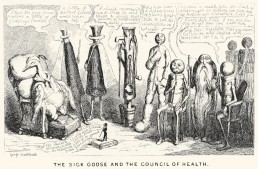In praise of big pharma:The Indefensible position

I know, I know, Big Pharma are bastards! They rig clinical trials, bribe doctors to prescribe their products, medicalise everyday problems by casting them as diseases that suddenly “need” expensive medication to control them and spend much more on marketing than they ever do on original research. And that’s before we take into account tax dodges and the shameful role pharmaceutical companies play in scandals such as the opioid epidemic in the US. They are up there with Big Oil and Big Banks in the array of hellish multinationals we all love to hate.
Except I can’t really join the jeering throng myself. I literally can’t live without Big Pharma’s products. No amount of echinacea or rescue remedy or bark carefully collected from trees in Vietnam’s highlands is going to reverse or even hold the progress of my chronic lymphocytic leukaemia.
I know people who believe their “natural” potions are what keep them healthy and that they will be effective against serious illness when it strikes but they seem to change their minds when their health actually collapses. They are suddenly happy to sidle off to conventional doctors to get the treatments they once claimed to be the work of the devil – aka Big Pharma.
No amount of rescue remedy is going to reverse or even hold the progress of my chronic lymphocytic leukaemia.
One acquaintance, who enthusiastically endorses complementary medicines and nutritional supplements, was clearly disapproving when she heard I had enrolled in a clinical trial for a new targeted cancer drug. She scowled and said: “Oh, so you’re going down the chemical route, are you?”
Sure was! And gladly! What’s more, she was too when she later developed a chronic, debilitating disease and found that only Big Pharma’s products could help turn her into a functioning human being again.
If there are no atheists in a foxhole, there are also very few cancer patients whose first port of call is a homeopath. Such people do, of course, exist, but not for very long.
Big Pharma may be bastards but at least their products mostly work, at least to some degree, and often astonishingly well. In my case, they have given me at least another two years of life so far and the hope of more to come.
Of course, Big Pharma should be criticised and held to account for their shadier practices – and, god knows, there are plenty of them. But I’d hate to live in a world without their products. Thanks to treatments made widely available by Big Pharma, tuberculosis, polio, Aids and other diseases that once killed or disabled thousands upon thousands can be controlled.
I know someone who had hepatitis C for decades after a misspent youth. A year ago, he – a burly builder – wept when he was told the revolutionary drug he had been prescribed had cleared the virus from his body. His crippling fatigue vanished and his productive life has been restored.
Serious childhood infections such as measles, diphtheria, rubella, mumps and tetanus have been mostly wiped out by vaccines. In my lifetime, the number of deaths from coronary heart disease has been slashed and life expectancy for many cancer patients keeps increasing.
The most widespread criticism of Big Pharma centres on the cost of their drugs. The experimental drug I am taking is yet to be approved for chronic lymphocytic leukaemia by the US Food and Drug Administration, but it is likely it will cost at least $10,000 a month when it is commercially available. And this is a drug that is not a cure and which patients need to take until the wily cancer finds a way around its defences.
When that happens, I may have to start paying through the nose for another drug, but if I’m really, really lucky I’ll be accepted onto another clinical trial.

The day I was told I had been accepted onto my first clinical trial in 2015, I was so happy I tipped the waitress who brought me a hot chocolate in the hospital cafeteria a $20 note. She was taken aback but I told her: “I’ve had a very lucky day!”
In fact, those drugs didn’t work very well and put me in A&E a few times but they cleared the path for me to get onto a second trial. After three years of treatment, my blood is finally normal for the first time since 2013. And not only are the drugs free but the pharmaceutical company gives me a $10 petrol voucher and pays for my parking each time I visit the hospital, which is a nice touch.
I have swallowed at least $360,000 worth of the company’s drugs so far on this trial and if I’d had to pay for them myself, I’d have had to sell my house by now and be facing eventual bankruptcy just to stay alive.
It seems entirely wrong that a company would charge so much for its life-saving products until you consider how long and hard the road to a successful drug is. It can take a decade or more to progress from laboratory to market. The cost of developing a new drug has been estimated as somewhere around $US160 million (by consumer advocates) to $US2.6 billion (by the pharmaceutical industry) but if the lower figure is anywhere near correct you’d imagine there would be many more entrants into the market given the money to be made in such a profitable business.
The best justification I can make for paying high drug prices – and the way I’ll console myself if I have to start paying exorbitant sums to stay alive – is to imagine being up on a murder charge. Whether I was guilty or innocent, I’d still want the best lawyer in town to keep me out of jail and give me my life back, even knowing he or she would charge like a wounded bull. I certainly
wouldn’t be haggling over the price to save my skin.
If that cost me hundreds of thousands of dollars, I’d probably consider the eye-watering sum worth it if I could raise it. I wouldn’t, of course, be thrilled to pay the bill – especially if I ended up in jail for a long stretch despite my counsel’s efforts – but I’d always take the chance, even if I was bankrupt at the end of it.
Paying for life-saving drugs that give you another shot at living is like that, even though – like an expensive defence lawyer – it’s always possible they may not succeed.
Governments and public bodies are always welcome, of course, to take the million- or billion-dollar risks that Big Pharma routinely does in developing new drugs. But it’s hard to imagine the public would have any appetite to be told on Budget day: “The government would have been in surplus without the $1 billion loss on our state-funded experimental drug development programme after all our clinical trials failed. We will have to make spending cuts all round.”
And guess who we are all going to turn to when increasing antibiotic resistance goes from being confined to relatively isolated incidents and suddenly becomes a widespread problem – particularly for the very young and the very frail? Not to mention when surgery for even routine procedures such as hip replacements and chemotherapy for cancer become extremely dangerous?
Already scientists fear losing control of malaria and TB and sexually-transmitted infections such as gonorrhoea, syphilis and chlamydia as antibiotic resistance grows. Faced with that possibility, the UK government has turned its mind to providing incentives for Big Pharma to develop new antibiotics.
Big Pharma prefers to create blockbusters that earn $US1 billion or more. The easiest paths to profitability are drugs to treat chronic conditions such as heart disease, not antibiotics that are taken as a one-off course for an infection. So the British government is mulling setting up a $US1 billion prize to encourage big pharmaceutical companies to develop new and effective antibiotics.
Although drug companies are seen – with good reason – as rapacious, they do have a softer, more generous side: Big Pharma gives away the greatest proportion of its profits of any industry. In 2013, biopharmaceutical companies led all other corporations by donating 19.4% of their profits before tax to charitable groups.
Most of this beneficence is in-kind product – ie, drugs – that also drums up new business and generates tax benefits, but it’s a gift nevertheless. The good news is that even if you’re not eligible for a clinical trial, you may get compassionate access to a drug that could transform your life. Big Pharma may be bad – perhaps very bad – but they’re not all bad by any means.